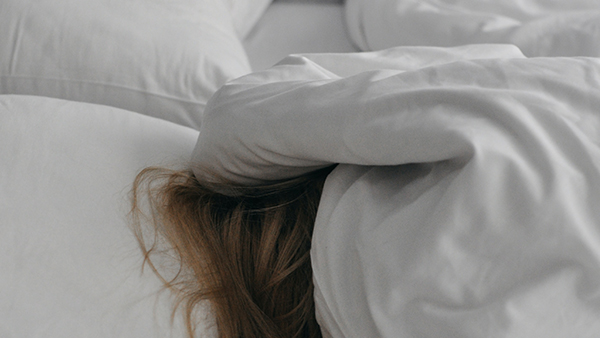What is PMS? Find out more, here.
PMS is short for premenstrual syndrome. It's caused by hormonal changes that occur between ovulation and menstruation and can cause issues for lots of women. 80% of women experience physical and psychological effects of varying degrees. Managing PMS effectively can impact your life in many positive ways.
Read time: 3 m
Verified by Jenny Jansson
Certified midwife
There is a range of PMS symptoms such as tender breasts, temporary weight gain, headaches, joint pain, sleeping problems, stomach pains and last but not least, psychological and behavioural symptoms. Increased appetite and sugar cravings are also common. Lots of women experience cravings for chocolate. It is a good idea, however, to choose a healthier snack, as chocolate causes blood sugar to spike which can leave you feeling worse when it wears off.
PMS and PMDS
Half of all women suffering from PMS seek medical care. Some women's symptoms are so severe that they need medication and CBT (cognitive behavioural therapy) or other therapies. PMDS (premenstrual dysphoric syndrome) is a type of PMS. 3-5% of women suffer from PDMS and the symptoms are so severe that they can affect women's everyday lives, work and relationships.
If you already have underlying health problems, PMS or PMDS can exacerbate them. For example vaginal herpes or migraines. There are some health issues that can be made worse by PMS or PMDS, such as thyroid problems or chronic fatigue syndrome. Seek help if you have any underlying conditions so your symptoms can be investigated thoroughly.
Unique to each person
Your emotional balance can be affected by hormonal changes which can include mood swings, irritation or feeling down or close to tears. PMS affects individuals differently. Some women experience discomfort monthly, some experience mild issues and a few show no symptoms at all. PMS usually goes away shortly after menopause starts and menstruation stops.
Probable causes
After ovulation and before menstruation the progesterone levels are high. PMS and PMDS seem to be linked with this hormone, also called the yellow body hormone. There are no definitive answers for the exact cause. The cause could be increased sensitivity as the brain is affected by the body breaking down progesterone. The symptoms appear days or weeks before menstruation. They usually disappear when menstruation starts and return after the next ovulation.
Relief and help
Over-the-counter pain relief can help. If the symptoms are severe, antidepressants may be necessary especially if there is a lack of serotonin. Antidepressants can be taken during the period before menstruation. Hormonal contraceptives can also help alleviate PMS symptoms for some women. PMS or PMDS can be side effects of some oral contraceptives so make an appointment at a family planning clinic or with your GP to discuss your options. There is also medication available for bloating. Counselling or CBT has been shown to help many women, as an alternative to medication.
How to help yourself
Fibre-rich food such as wholegrain bread and porridge can help, as well as decrease consumption of salt and caffeine. Regular exercise can also help as physical activity can increase the production of endorphins which improve your mood. Smoking can worsen symptoms so try to stop if you can.
Sleeping better can also mitigate the symptoms. Relaxation exercises can help you to unwind - as stress can make the symptoms worse. Track your menstrual cycle and try to handle stress and improve your sleep during difficult periods in your cycle.
Don't be afraid to seek help from your GP or psychiatrist if your symptoms are severe. A diary can be helpful to track your symptoms before menstruation.
Verified by Jenny Jansson
Certified midwife
More from Preggers
Hundreds of related articles, podcasts & more waiting for you in the Preggers app.
Download Preggers today.

